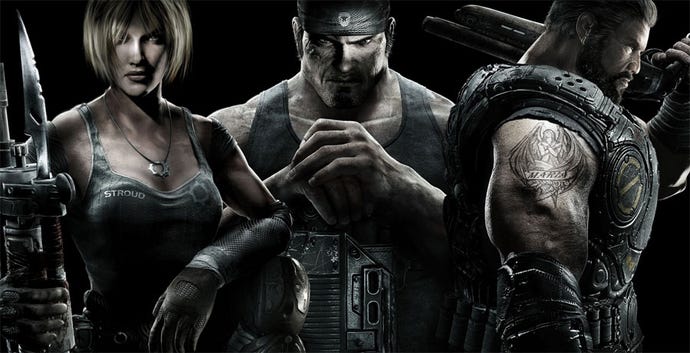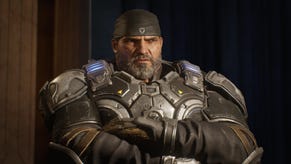Gears of War sale won't bring Epic changes to Xbox's second-best core IP
Gears of War now belongs to Microsoft. What does this mean for Epic, and for Marcus and co? You've got questions; we've got answers. Well, guesses.
Gears of War has been sold off to Microsoft, and suddenly everyone's asking questions. Why would Epic Games let go of its IP? Does it need the money that badly? Is the franchise going to go down the drain? What is Epic going to do now? Are the end times upon us?
Hush your worries, children. Everything is going to be fine, although I'm not ruling either way on the likelihood of a 2014 Ragnarok and have prepped my chain mail just in case. Let's address the other questions in order.
Why would Epic let go of its IP?
While we can't speak with certainty about how every staffer at Epic feels about Gears of War, I'd guess as a whole, the studio is pretty sick of it. Recent comments from Mike Gamble, along with Epic's history, demonstrate a company ethos that values new IP and experimentation over repeating the same formulas. Gears of War was a franchise published by Microsoft, and Microsoft is looking for regular releases and a specific level of performance that could only be achieved by rote repetition of formulas - enlivened only by industry-wide trends, as when multiplayer was introduced.
Making the same IP over and over again isn't fun, and Epic has shown signs of losing interest. The two men who helmed and fostered the Gears of War franchise, Cliff Bleszinski and Rod Fergusson, both left the company. The last entry, Gears of War: Judgment, was a prequel - it didn't move the fiction forward creatively - and was developed by People Can Fly. That Epic palmed off its major IP to a subsidiary studio suggests it had something else to work on, and as we now know that something wasn't Gears of War for Xbox One, we can only assume it had other fish to fry.
Does it need money that badly?
No, it does not. It's easy to look at Epic as a one-trick pony; first that trick was the Unreal series, and then it was Gears of War. But Epic has one major iron in the fire that pays the bills: Unreal Engine, one of the most commonly-licensed third-party engines on the market. Always at the forefront of development, and with few genuine competitors, Unreal Engine has drawn licensees from all over the industry, powering franchises as diverse as Mass Effect, Batman: Arkham, XCOM, Tom Clancy, Tony Hawk, Mortal Kombat and many, many more. Does this bring in the moolah? Does it ever. Epic's got enough financial grunt to experiment - quite successfully - with mobile, to announce and cancel projects without breaking a sweat, and even to open an entire new studio for a trial period.
As Gamble let us know recently, there are a cluster of unannounced next- and cross-gen Unreal Engine 4-based games in the works, all of which will be helping line the company's pockets, and by most accounts getting their money's worth, as Epic supports its partner studios and continues developing the base tech.
Is the franchise going to go down the drain?
At a guess, I'd say no, but that depends on whether you felt Gears of War: Judgment was excellent, or kind of phoned in. If the latter, it does feel like Microsoft is in agreement with you, because it did bugger all to promote the game. Gears of War is a very important Xbox franchise, right up there with Halo, and for the most recent release to be thrown to the dogs made little sense, even in the context of the Xbox One's looming reveal. It starts to look more rational though if you imagine it as a contractual obligation that neither side was very happy about.
That's all conjecture, of course, but here's another bit of speculation I think is pretty compelling: Gears of War has been taken away from a team who weren't very interested in it and given to a team for whom it could be a big break - a chance to enter the big leagues, make some serious cash, and be part of something fans love. That's exciting. It's also exciting that Rod Fergusson is leading the team. Yes, he did leave Epic while it still owned the franchise, but he left Epic as Gears of War was given away to People Can Fly; in other words, when it stopped being a priority for Epic. It's easy to imagine him sadly walking away after the rest of the company lost interest in his baby, and jumping back on board now that someone wants to love it the way it deserves.
What will Epic do now?
Your guess is as good as mine. (Ha ha! Just kidding. I get paid for my guesses.) One obvious answer is Fortnite, a free-to-play, multiplayer building and survival sim with a day-night cycle and vicious monsters. Yes, it sounds a bit like Minecraft but really, in today's glut of survival sandboxes - DayZ, Rust, Project Zomboid - everything owes something to Minecraft. If it seems like a departure for Epic, that may just mean you weren't around the last few times Epic surprised us. You have to remember that one of the company's first games was Jazz Jackrabbit. Epic's evolved over the years, and since its core business - Unreal Engine 4 - pays the bills, it's in a position to evolve again.
If you're still doubtful, it's worthwhile remembering that when Gears of War was first announced it seemed completely mental. It was a hard sell. Even saying that seems incredible now, but there was a time when guns with chainsaws on them sounded stupid rather than an obvious money-maker. The first time we saw those great hulking character models and saw a third-person shooter that expected us to take it seriously as a reticule-action game, we sneered and we laughed. Foolishly. We ought to have bought stock.
What should I do?
What we're doing. Sit back, reserve judgment, be optimistic. Microsoft wants Gears of War to be rad as much as you do, and, going by the evidence to date, more than Epic does. The really interesting unanswered question is not "what will happen to Gears of War?", but "what will Epic do now that it's no longer tied to Gears of War?" I can't wait to find out.








